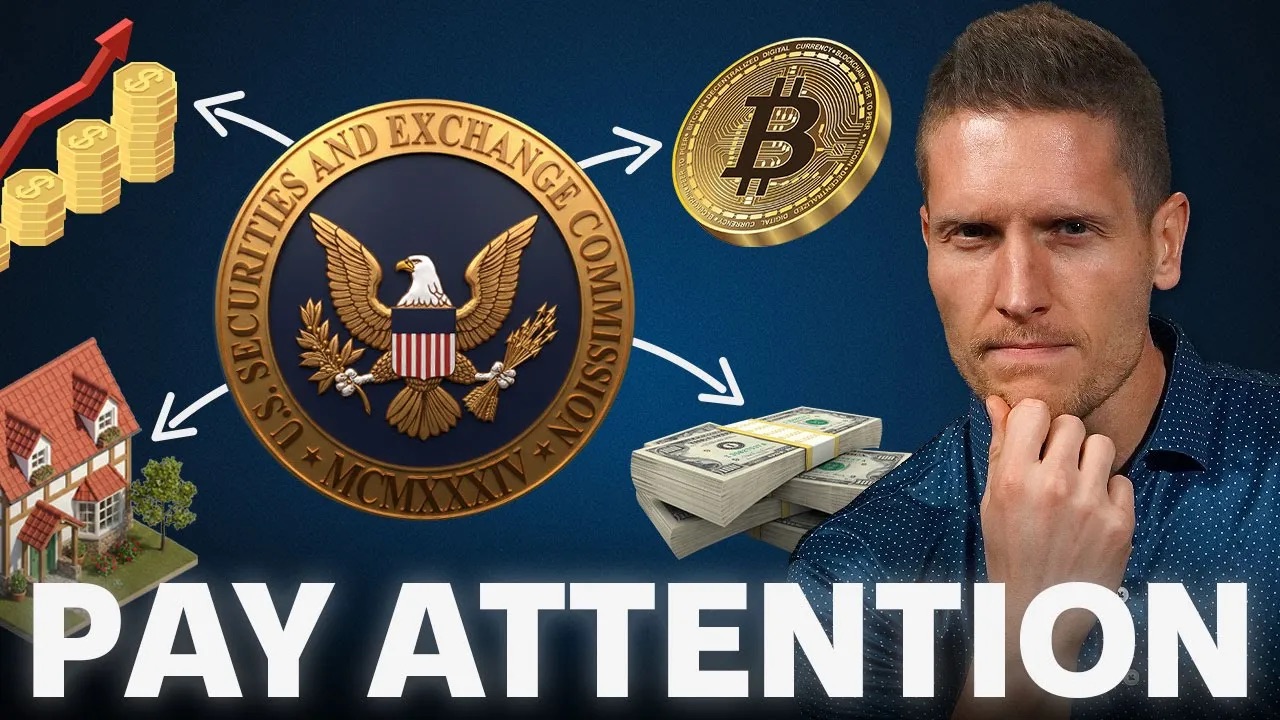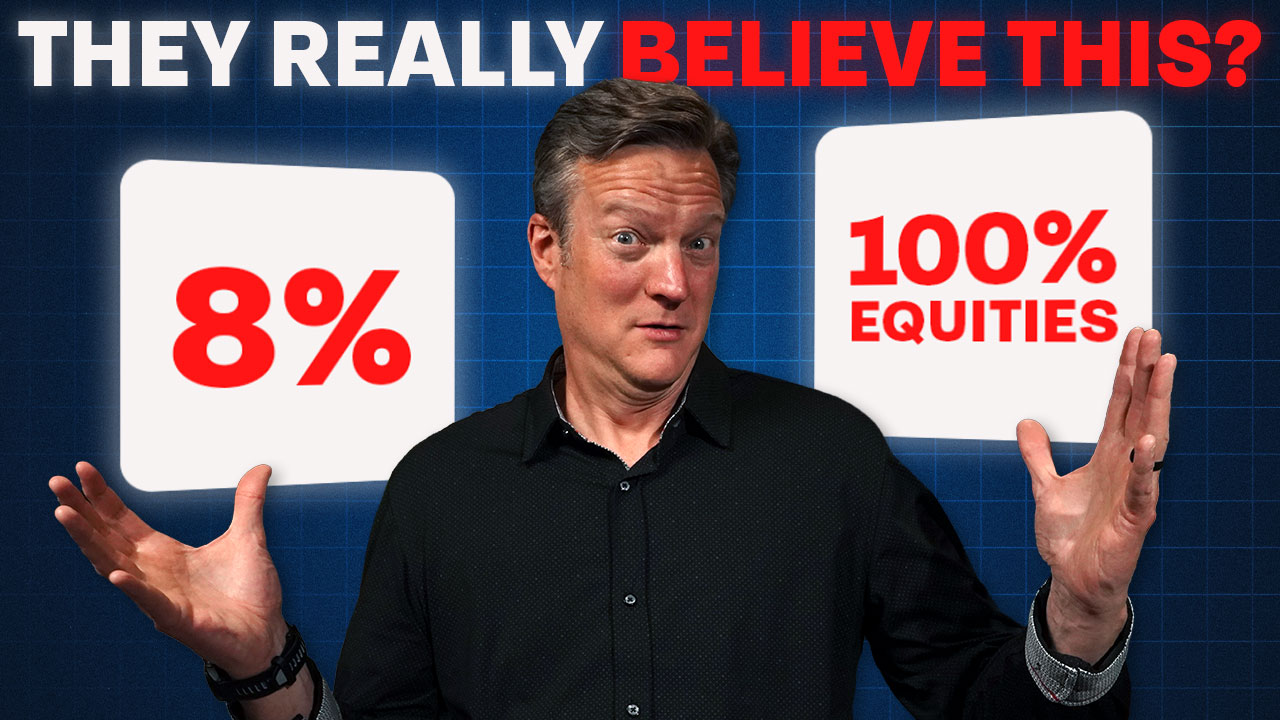Let’s talk about another one we’ve gone through. We’ve talked about the small education of investing yourself, and we’ve talked about entrepreneurship. Now let’s talk about real estate. Yeah, this is another one; again, this is a financial risk that can be very risky, but it can be very profitable. There are wonderful pieces and parts to real estate, but I worry. So much of social media, so much of the financial media, so much of the information out there only shows you the brochure. They only tell you academically why real estate is a no-brainer, you should do it; it makes all the sense in the world without telling you the other side. Why is it risky, and what are the things that you ought to be nervous about if you are going to get into real estate investing?
Well, I mean, I think people, and you saw this in the Great Recession back during 2008 all the way out to 2012, there was this period right before the collapse where people thought, “Well, you know, they’re not making more real estate unless you live by a volcano. It’s just not popping up out of the water. So how could this ever go wrong?” But the reality is, real estate doesn’t always go up. We’ve learned that lesson. Look at what the median home prices have been in the United States for the last 23 years. It’s wild. If you look from 2020 to 2023, there was a median home price change of 26.5%. Or you can look at the annualized change from the year 2023; it’s 4.1%. So on the surface, it looks like, “Oh, the market goes up; real estate makes money; it’s great.” But that’s not always the case. If you think about the Great Recession, what we saw happen in 2008, 2009, it was a drastic and devastating drop in real estate prices. And we’ve seen that same thing happen since 2021; we’ve seen real estate prices drop over the last couple of years. So, it is not always rainbows and butterflies when it comes to real estate investing.
Yeah, I think when I look at this chart, the big thing I notice, just like I said earlier, is 2008 all the way to 2012. You look at this chart, and you go, “Wow, not only do you have to worry about potentially it could go down, but it just sits flat for a period.” That’s why we always talk about U-shaped recoveries. Look also at 2018; I mean, 2018 all the way through 2020, the market is completely sideways. Those are the problems. It’s hidden within the numbers because home pops happen in periods. You can kind of see it here where all of a sudden the market runs up. Pay attention to that because it might be hidden within the data points that this is riskier and that you might be expecting things that aren’t always going to happen in real estate.
Another thing that happens is there may be factors outside of your control that can impact how viable this is as an investment opportunity. A really great example is the end of Airbnb in New York. If you are someone who is going to be a real estate investor and you started buying up properties to do short-term rentals inside of New York, you got a rude awakening when the rules changed on you, when there were things outside of your control that systemically changed that no longer allowed you to do the thing that you were planning on doing. Well, we know that these things happen. This would be one of those “dodo” plan things you should play out that we’ve seen play out practically. So, if you find yourself overextended here, I think you’re going to get yourself in some trouble. Airbnb is an easy one to sensationalize because it’s all over the press right now. But I will tell you this happens all the time also in communities like, think about college towns. We’ve had this run-up in real estate values that I think a lot of naive investors will think, “Well, hey, I’ll go buy a house; I’ll rent it out to Airbnb, four, five, six different college students. They can split it up, share the cost, and I’m going to make a ton of money off this because I’m going to have other people paying for rent.” And then all of a sudden, you find out because a neighbor reports it, the zoning doesn’t allow that many unrelated people to live together. You need to be very aware there are a lot of things that happen in real estate that are completely outside of your control. So just be careful.
So, I think that we’ve unpacked why it’s risky and why it can be scary. But now let’s talk about why people do it. And there’s one word that immediately comes to mind. And I don’t know if people would use this word, but this is the reason why. Because when you think about the returns that happen in real estate and the success stories you hear, most often it is because leverage is involved. You’ve borrowed money to make an investment. Because you’ve borrowed money, you’re using someone else’s money to perpetrate this. The returns that you get on your capital get compounded over and over, and it starts to look amazing when you look at it on paper. So we did an oversimplified example here, and it’s on purpose. There are some extra factors we could put, and we did a terror chat because, I mean, why not? This is what Daniel decided to go with the names, but the terror chat buys a $500,000 investment property and puts 20% down. So he’s got $100,000 in this half-million-dollar piece of property. But here’s the crazy part: This property, let’s just say this all happened pre-pandemic. The property appreciated 50% over the last five years, and we’ve seen this happen. This is not far-fetched; we’ve seen real estate values do this. So you think off the cuff, you’re like, “Man, that’s a 50% rate of return over the last five years.” No, remember, this is levered debt on the property. It gets better in this best-case scenario.
So when you think that Chad’s initial investment, that $100,000 he put down, has increased by 250% due to the power of leverage. Remember, he borrowed money, but he gets to keep all of that appreciation. So he has a $100,000 investment he made in the profit, plus a 250% gain. So he has made a huge rate of return in a very short period of time because he was able to leverage his growth. Now look, I do because I know people are always looking to poke holes in things. I recognize actually this could be even bigger for Chad, and the fact that not only during this period of appreciation, he’s been paying down principal on this. We didn’t even take that into account that he’s paid down the mortgage over those years. But I think it’s just worth noting: Yes, leveraged debt when it works is beautiful, as long as you have somebody who’s paying your rent and making sure it all happens, it really is a magical thing.
So, the growth and the opportunity are there. But another reason people like to do real estate and why people are attracted to it is because it can create income and cash flow. It’s not uncommon; you hear somebody say, “Okay, well, I’m going to buy a rental property, and someone else is going to pay the mortgage. And once the mortgage is gone, I’m just going to have free cash flow flowing my way.” So that is an attractive thing that can be true about real estate, but it’s not always true. And then another huge benefit that we always hear about, Brian, is there are substantial tax benefits when it comes to real estate. But I worry often times the brochure people are sold around the tax benefits may not be what plays out in practice. While it is true, there are some amazing tax benefits that can benefit certain investors or certain individuals. It’s not always the way that your brother’s uncle’s best friend’s neighbor told you it was going to go. Well, look, it is; I mean, I think if your income is below a certain point, it is nice that you get to take the depreciation hit. You get to deduct up to $25,000 of your ordinary income off your taxes. I mean, that’s powerful. The problem is, once your income gets into six-figure level, they make you basically carry it over until you sell the property. So, it’s just, it’s good, but it’s just not as good as the brochure tells you, especially once you start having the success that you probably need anyway to even be able to do real estate.
The other thing I think is interesting, like cost segregation on commercial real estate and other things where you can pretty much accelerate depreciation on anything that has a life less than 15 years. You can get into multi-million dollar deductions rather quickly. The part that’s in the brochure, the part that makes it a little harder is unless you’re like a real estate professional, it’s hard to have enough income to offset all of that in one year because most people who are treating this as a passive investment or even have a business that they have their company in, it’s hard to offset those two things together. So just understand it. But I’m not taking away; without a doubt, there are tremendous tax benefits just like there are tremendous benefits with leverage, de-lever debt. It’s just you need to understand how to do it right, that’s it. If you’re going to do it right, there’s some things we want you to keep in mind.
Number one, wait until the time is right. Whether you’re thinking about buying residential real estate or you’re thinking about commercial real estate or maybe you’re even thinking about doing real estate syndications and entering into some limited partnership-type deals in order to access this asset class, you want to make sure that for where you are in your financial journey, the timing is right and it makes sense and you don’t jump in too early. Yeah, I’m going to hold it up, give you all the sound effects and everything. Is that I love real estate, but it needs to be a step eight of the financial order of operations. You can go to money.com/resources, download your copy. And why do I say that? The reason I say that is that you’ve got to have a good financial foundation underneath you. That’s steps one through seven so you can weather any storms that come your way, especially if your property has a mortgage on it. If it’s levered, you need to be able to weather the storms because there might be some months that you have to make large repairs like put a roof on it, or you have to change tenants because there’s just lots of things that can come your way. I remember when we got into real estate, somebody we have a lot of respect for, you guys. Congratulations. I’m so excited for you guys, but boys, I hope you got enough money to weather the hard times. And that’s good advice, and I think that’s something people need to understand. You’ve got to get the timing right. And let me bring this into what something we covered earlier is that I think people have what’s called recency bias. But we know in the pandemic, real estate went up 50 to 60%. I would challenge people to think about the fact that if we know real estate typically makes 4% a year. But if it made 40 to 50 to 60% over the last, depending upon which part of the country or what type of real estate it is over the last five years, do you really think you can set your clock to you’re going to get the same 50 to 60% in the next few years that are coming? I think recency bias as well as reversion to the mean are real things, and you need to plan accordingly. And the other thing you need to think about with real estate is you need to choose your location well. Just because you hear about something that might be attractive, it might not be attractive in your area. Brian, where we’re both from in South Atlanta, it would not have been incredibly difficult to buy a lot of residential real estate properties. There was a strong rental market. You get tenants in there; it works. Now, where we live in a suburb of Nashville, it’s very different. Home prices are very different. The community in which we live is very, very different. So the different types of real estate investment might make sense in different types of geography. So when it comes to investing in real estate, don’t just buy or look for the opportunity that you think might make sense. Make sure you’re really thinking through why will this be a good purchase, a good investment, a good opportunity over the long term. Yeah, and then I so, location, location, location to kind of sum up what your point was. But I do think this last one, and this is going to be kind of old man on the front porch. I don’t know that everyone needs to invest in real estate and definitely not start in real estate. We love real estate, but I do think it’s a step eight of the financial order of operations to do it right. And I think that even though there’s a lot of TikToks out there and there’s a lot of sexy sizzle to it, just make sure you understand the ins and outs to do it right because leverage debt cuts hard and hits hard. And I just want to make sure you navigate that well. For more information, check out our free resources.










